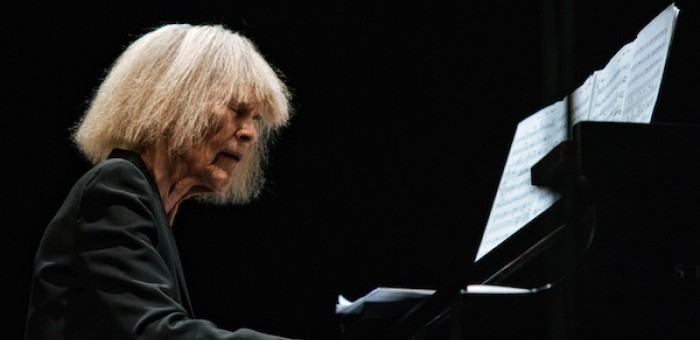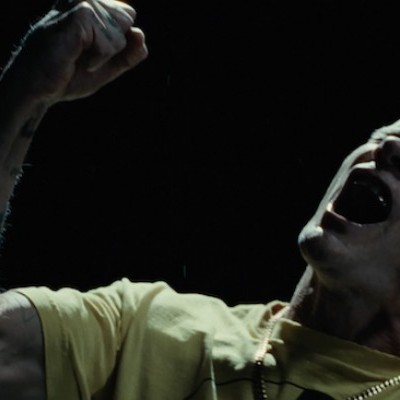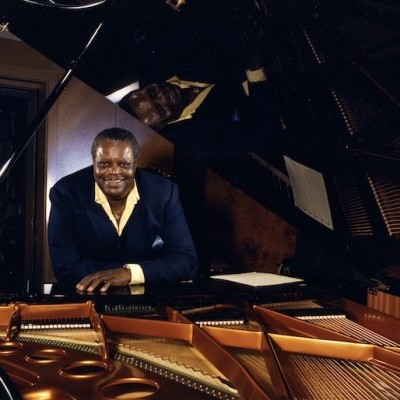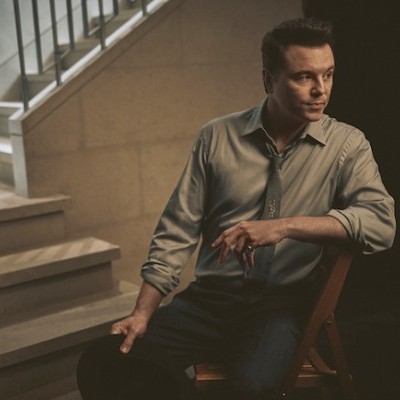Dec 9, 2025 12:28 PM
In Memoriam: Gordon Goodwin, 1954–2025
Gordon Goodwin, an award-winning saxophonist, pianist, bandleader, composer and arranger, died Dec. 8 in Los Angeles.…

Carla Bley was among the jazz-leaning instrumentalists that performed at the Big Ears Festival in Knoxville, Tennessee, March 23-26.
(Photo: Andrew Gresham)Perched on a stool in front of a projector screen and nestled behind a laptop, alto saxophonist Matana Roberts had a message for the crowd crammed in the tiny performance space: “If you don’t like it, that’s fine,” she said, smiling. “If you do like it, that’s fine, too.”
Appearing during the opening night of the four-day Big Ears Festival in Knoxville, Tennessee, which ran from March 23–26, Roberts was referencing her illuminating and captivating performance piece Coin Coin Chapter 3: River Run Thee (also a 2015 album on Constellation Records), which she played in its entirety. But her comments were also applicable to the festival as a whole.
Big Ears began, in 2009, as a much smaller series of concerts, showcasing what has now been developed as the festival’s core aesthetic—compositional experimentalism. After two festivals, promoters hit the pause button until 2014, and the event has been growing in renown ever since. The 2017 version featured composers like Meredith Monk and Gavin Bryars alongside more rock-adjacent acts like Wilco and My Brightest Diamond. Jazz-leaning instrumentalists—saxophonists Roberts and Steve Lehman, composer and pianist Carla Bley—were well represented as well.
During Roberts’ performance, the reedist captivated an audience sandwiched into one of the event’s smaller venues. In her hour-long set, Roberts user her entire breadth as a saxophonist—from her rich, caramel sound to her sharp-edged barbs of noise. This was bookish music that seemed challenging at times, but was still wholly accessible.
The opening evening’s concerts began with composer and pianist Bley leading the Knoxville Jazz Orchestra, which augmented its ranks with long-time Bley collaborators Steve Swallow on bass and Andy Sheppard on tenor saxophone, in the picturesque Tennessee Theatre.
Sheppard and Swallow have long appeared in trio settings with Bley, and the group reprised that more intimate aesthetic the following night, but this maiden big band show was about loudly, emphatically celebrating Bley’s compositional skill. Pieces like “Setting Calvin’s Waltz” and “The National Anthem” put Bley’s complex brand of writing on display—long, twisting pieces of music that require stamina and intense attention from the musicians. In addition to the many capable soloists that make up the Knoxville Orchestra, Sheppard’s wide, tree-trunk tenor sound stood out.
Throughout the set, Bley kept tight control over the orchestra, rising from her piano to conduct the band through thornier passages. Bley’s compositions are like chapter books, with new themes and ideas emerging on each subsequent page. The band handled these developments admirably, never getting lost in the thick brambles of polyphony that punctuate Bley’s music.
Toward the end of that first evening in Knoxville, pianist Matthew Shipp and drummer Bobby Kapp, decked out in a turquoise sequin sport coat, presented mammoth bouts of roaming jazz. Shipp is a kinetic being at the piano. He’s constantly in motion, with dense clouds of 16th notes issuing from his fingers. Just as quickly, he can retreat into a serene tranquility, hammering softly away on a chord, exploring the sonic potential of a few simple notes.
At one point in the sprawling set, Shipp alternately drew back his arms in a quasi-swimming stroke before shooting his arms toward the keyboard, but instead of plunging in, his fingers hit the keys with a quiet force, ever so subtly pulling back muffled sound from the instrument.
Steve Lehman, who played March 25 with the Sélébéyone band, was one of the most incendiary saxophonists of the festival. He weaved frenetic bebop runs in and around hip-hop beats, creating emphatic responses to rap verses in harmony with soprano saxophonist Maciek Lasserre. In a festival that tends to fall apart when the schedule veers off track, Lehman and his group began playing late to a crowd that had drifted off in search of other music.
Big Ears presented a variety of jazz instrumentalists in a number of settings throughout downtown Knoxville. After her opening-night gig, Roberts appeared in a number of different settings throughout the weekend; Bley and her compatriots played twice, and Shipp reprised his piano style with a solo show later in the festival. In this way, promoters gave jazz lovers ample opportunity to experience these musicians in multiple formats.
The myriad concert options—in some cases, shows were stacked atop one another across the festival’s eight concert spaces—created a dreaded festival scenario: missing one show in order to attend another. This undeniable fear of not being there for a special collaboration, not witnessing an exceptional solo, was impossible to avoid.
But during a weekend where hearing an entire set seemed like a luxury, the opportunity to see so many avant-garde leaning artists in one place in such beautiful surroundings eased the pain. DB

Goodwin was one of the most acclaimed, successful and influential jazz musicians of his generation.
Dec 9, 2025 12:28 PM
Gordon Goodwin, an award-winning saxophonist, pianist, bandleader, composer and arranger, died Dec. 8 in Los Angeles.…

Flea has returned to his first instrument — the trumpet — and assembled a dream band of jazz musicians to record a new album.
Dec 2, 2025 2:01 AM
After a nearly five-decade career as one of his generation’s defining rock bassists, Flea has returned to his first…

“It’s a pleasure and an honor to interpret the music of Oscar Peterson in his native city,” said Jim Doxas in regard to celebrating the Canadian legend. “He traveled the world, but never forgot Montreal.”
Nov 18, 2025 12:16 PM
In the pantheon of jazz luminaries, few shine as brightly, or swing as hard, as Oscar Peterson. A century ago, a…

Dec 11, 2025 11:00 AM
DownBeat presents a complete list of the 4-, 4½- and 5-star albums from 2025 in one convenient package. It’s a great…

Seth MacFarlane takes a turn from his television and film career to sing arrangements made for Frank Sinatra, but never recorded.
Nov 18, 2025 12:04 PM
“I’m not gonna lie to you — I don’t know why I thought this was about The Naked Gun, but I’m happy it’s…